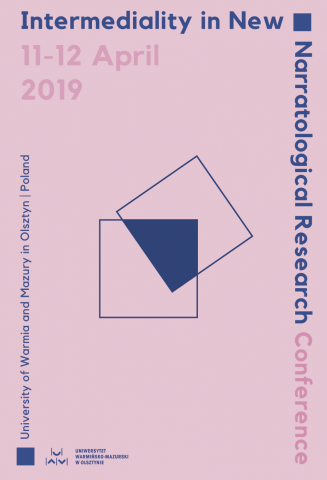11-12 April 2019
Olsztyn (Poland)
Keynotes:
Maria Mäkelä (Tampere University)Magdalena Rembowska-Płuciennik (Institute of Literary Research of the Polish Academy of Sciences)Jan-Noël Thon (University of Nottingham)
Narratology is undoubtedly a dynamic and diverse field within the humanities today. In recent years it has spread across media, modes and genres as well as major social sciences: history, sociology, psychology, just to name a few. Accordingly, it is commonplace to use the name of the discipline in plural – as narratologies – to account for its methodological heterogeneity and to indicate its terminological variety. We would therefore like to (re)open a discussion on intermediality in narratology, following the definition of media proposed by Ryan 2004, Ryan and Thon 2014, and others, as well as mode by Kress and van Leeuwen 2001, Ryan 2014, and others. In our view, intermediality has intrinsic value for advancing our thinking of narratives, both old and new.
On the one hand, the term pertains to artistic and theoretical practices of Dick Higgins (i.e. transcending and/or existing in an unspecific area between individual media) and, on the other, to Julia Kristeva’s concept of intertextuality. In narratology, intermediality is the medial equivalent of the latter, and it covers any kind of relation between different media and, more narrowly, the participation of more than one medium in a given work (Wolf 2017; Grishakova and Ryan 2010). Taking the cue from current narratological researches, we want to argue for intermediality as an essentially contemporary strategy for approaching narratives in literature, film, TV, games, visual arts, theatre, journalism, and social media, and across linguistics, psychology, philosophy, cognitive science, politics, law, medicine, history and art history, etc.
In this understanding, our goal is to investigate complex structures within narratives that signal the dialogue, or polylogue, between media either directly (adaptation, quotation, description, or
imitation) or indirectly (allusion, borrowing or metonymy) in constituting a narrative. We want to look into intermediality as a vital component for narrative production and consumption, an indispensable readerly competence in our (post)postmodernist reality as well as a means to describe any dynamic medial interactions and tensions within a given narrative.
We are keen to investigate not only the source text and target text but also the very process of medial translation and transposition, and what is gained and what is lost in this process.
ORGiN’s 2019 conference will focus on post-classical narratology in general and investigate the potential applicability of intermediality in studying narratives across media in particular. It will serve as a platform for discussing the contemporary narrative theory and practice and, if possible, as a window on its nearest future. Below is the list of possible topics:
- the concepts of intermediality and intermodality in narratology
- mediality in narratives across disciplines
- intermedial storyworlds; intermediality and hybrid genres
- intermediality and enactivism and embodiment in narrative
- intermediality in narrative from the perspective of cognitive narratology
- cognitive consequences of the migration of a story from one medium to another
- the new media; media consumption, media reception and contemporary narratology
- interchange of literary modes and means between artistic and everyday storytelling
- shifts between narrative media, intermedial blends and allusions
- intermediality in studying non-literary material
- interchange of literary modes and means between artistic and everyday storytelling
- intermediality in the stories that people encounter and use (or co-construct) ineveryday life; how, where and why are they told and exchanged?
- intermediality and socially sanctioned storytelling practices
- shift from the text-based culture to image-based culture and narratology
- intermediality in the novel studies
- ethical and ideological dimensions of intermedial narrative.
Please submit your abstracts for a 20-minute presentation or panel proposals of 3-4 papers. The abstracts and proposals should not exceed 300 words. A bio note of max. 150 words with your affiliation and email address should be added. We kindly ask you to name your files FIRSTNAME_LASTNAME and send it as a pdf.
Please send your abstracts and proposals to intermediality.orgin@gmail.com by 28 February 2019.
Participants will be notified of their acceptance no later than 15 March 2019.
The Conference Organizing Committee
start_date:
end_date:
News image:

News type:
